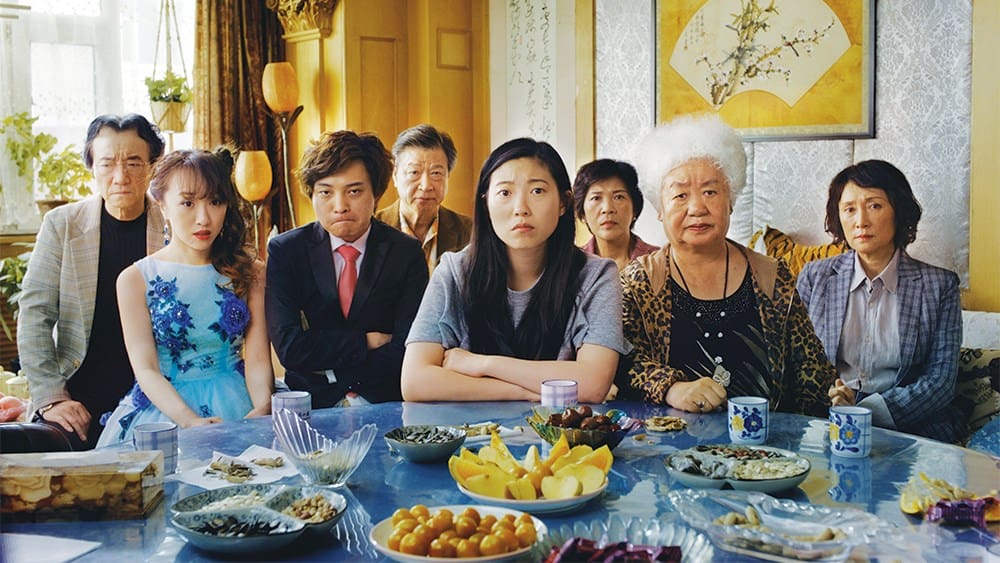
Early in The Farewell, the new film from writer-director Lulu Wang, the father of the protagonist tells a joke at dinner party. He describes a woman who chastises her husband for giving her bad news the moment she arrives home and tells him to soften the blow next time by saying something like the cat got on the roof before delivering news of the cat’s fate. The punchline comes when the woman comes home and her husband says her mother got on the roof. It’s a dark and silly joke, but it also establishes one of the film’s major themes early: the difficulty of delivering bad news to those we love.
In the film’s case, that bad news is that our hero Billi’s (Awkwafina) grandmother–whom she calls Nai Nai (Zhao Shuzhen)–has Stage 4 lung cancer and only has a few weeks to live. It’s tough for Billi to hear, but it’s only made tougher by the fact that not only has the family decided to hide the diagnosis from Nai Nai, but they don’t think Billi should come to China to visit before Nai Nai passes because they fear she won’t be able to keep the secret.
Billi, a 30-something New Yorker who’s two months behind on her rent and has just found out she didn’t get a prestigious writing fellowship, flies out anyway. As she and the family plan the cousin’s wedding that serves as the justification for the family gathering, Billi begins to wonder if maybe lying is the right thing to do. Based purely on the premise, The Farewell sounds like a downer, but thanks to a smart script and an excellent cast, it’s instead a funny, moving story about the secrets families keep to protect each other.
Let’s start with the acting. Awkwafina stole dozens of scenes in comedies like last year’s Ocean’s Eight and Crazy Rich Asians, but she’s understandably more subdued here. Sad and quiet even before Billi hears about Nai Nai, there’s a compelling stillness to the character that’s only amplified when she’s forced to hide her grief. In the scene when Billi sees Nai Nai for the first time, the look on Awkwafina’s face makes it clear how conflicted Billi is about keeping the secret even as she tries to hide the wave of grief that hits her. It’s a brilliant moment of performance and Awkwafina does it over and over throughout, making it look almost easy.
That said, the supporting cast is just as good at conveying that potent mix of grief, guilt and conflict. At the family’s first dinner together, each actor gets to trace a similar journey as Nai Nai chatters happily about the wedding preparations. Shuzhen is brilliant in the scene, playing Nai Nai as oblivious and lovable because of it, and there’s a dark comedy to the way the family struggles not to emote as she talks. That same twisted sense of humor carries through the whole film and it’s integral to what keeps it from becoming maudlin.
One of the most bizarrely funny scenes comes when Billi’s uncle, Haibin (Jiang Yongbo), speaks at his son’s wedding reception late in the film. Though he starts by expressing his joy for his son and his new daughter-in-law, he quickly falls apart as he thanks his mother for helping plan the wedding. Watching Haibin struggle to speak through his sobs as the guests go quiet is both horrifyingly funny and oddly cathartic. Sure, he may be one of the family members most committed to hiding the diagnosis from Nai Nai, but even he can’t help but be swept up by his emotions in the face of such simultaneous joy and grief.
There and throughout, those emotions are precisely what make a film so steeped in a specific culture and place feel universal. The way Billi’s mother refuses to make her the requested dozen dumplings or her grandmother comments on her weight the second she appears may be specific to that family and background, but many women will recall hearing those kinds of playful yet hurtful comments from their own mothers and grandmothers. Likewise, anyone whose lost a parent or seen their spouse lose a parent will recognize the way Billi’s parents behave.
The Farewell may be about an experience most people will probably never have, but in conveying the family’s grief in such an, ironically, honest way, Wang and her capable cast deliver something emotionally deeper and more relatable than expected. Everyone may process grief in their own way, but Wang’s film suggests that sometimes leaning on your family during those hard times can ease the pain.


Comments are closed.